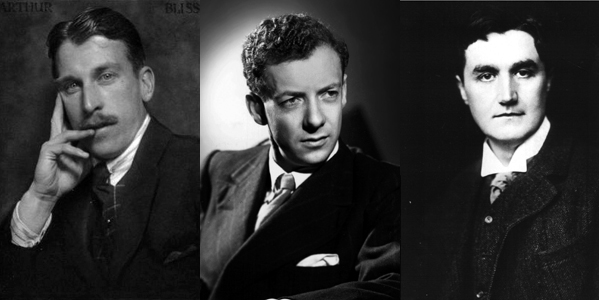In spite of wide divergencies of personal style, there is a common factor in the music, say of Schumann and Weber. And this common factor is nationality.
Ralph Vaughan Williams, from National Music, Bryn Mawr College, fall 1932

Our return to live performance in Jordan Hall on March 20, 2022 at 3 pm features works by three well-loved British composers and recalls the quest for new inspiration, personal style and national identity as tastes and techniques for creating new music shifted around the turn of the twentieth century.
For inspiration two of our composers turned to commissions for individual players they admired: Sir Arthur Bliss to virtuoso oboist Leon Goosens for his Quintet for Oboe and Strings (1927), and Sir Benjamin Britten to the brilliant cellist, Mstislav Rostropovich for whom he was to write his Sonata for Cello and Piano (1961) plus four additional works.
The origins of the Ralph Vaughan Williams Quintet in C minor (1903) are not as clear. Although written for the same ensemble that comprises Schubert’s Trout Quintet, piano, violin, viola, cello and bass—and containing a hint of variations on a theme he was to use elsewhere—it also experienced several revisions and was among many early works withheld from publication by the composer. It owes its reappearance in 1999 to the donation of his papers to the British Library by his widow, Ursala Vaughan Williams, and intense interest by scholars and players in the pure instinct of his earliest works. Our performance, if not the first in Boston, will surely be among the most rare. Ralph Vaughan William also wrote and spoke about the universal appeal of intensely national music:
I think there is no work of art which represents the spirit of a nation more surely than Die Meistersinger of Richard Wagner. Here is no plaything with local color, but the raising to its highest power all that is best in the national consciousness of his own country. This is universal in truth, universal because it is so intensely national.
National Music, 1934
Each of our British composers treads a different national path toward universal truth. In our rehearsals more than one player remarked at how distinctively French the Bliss Quintet sounded in its harmonies, melodies, and instrumental colors (references to music of Debussy and Ravel), except for the raucous third movement when he first quotes Connelly’s Jig, a local tune in the same Gigue rhythm and beat used by Bach and others to conclude their ‘international’ suites by going, at last, to the local folk.
For Britten the choice, evident in his Italian movement titles, was to be completely descriptive of what he wants us to hear, feel, and players to do with the five movements—Dialogue, Scherzo-pizzicato, Elegy, March, Perpetual Motion—that make up his Sonata.
In three movements Vaughan Williams evokes the transcendent by using melodic modes and formulas reminiscent of Medieval and Renaissance music. He models timelessness by allowing the sounds and materials of his themes and motifs to live beyond the boundaries of the movement in which they are first heard.
Enjoy
